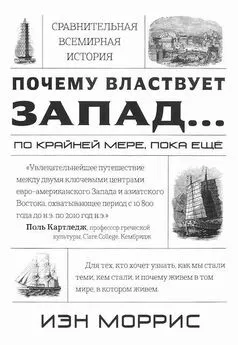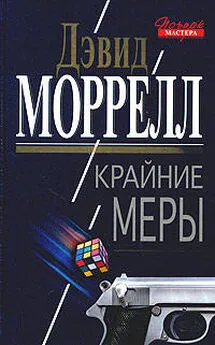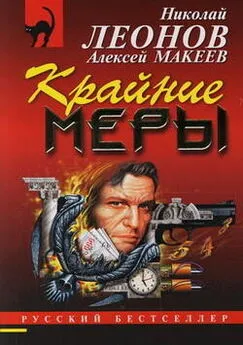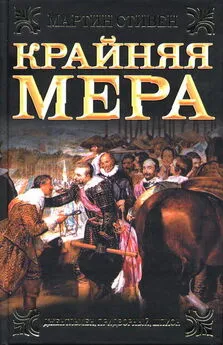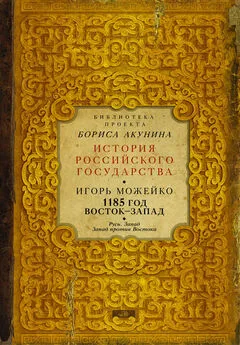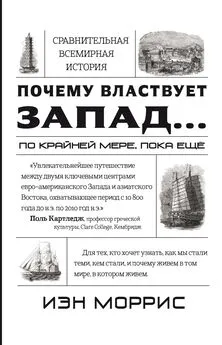Иэн Моррис - Почему властвует Запад... по крайней мере, пока еще
- Название:Почему властвует Запад... по крайней мере, пока еще
- Автор:
- Жанр:
- Издательство:Карьера Пресс
- Год:2016
- Город:Москва
- ISBN:978-5-00074-078-1
- Рейтинг:
- Избранное:Добавить в избранное
-
Отзывы:
-
Ваша оценка:
Иэн Моррис - Почему властвует Запад... по крайней мере, пока еще краткое содержание
Известный историк и археолог, преподаватель Стэнфордского Университета Иэн Моррис рассказывает о 15 тысячелетиях человеческой истории, последние два из которых Запад играет в мире доминирующую роль. Моррис объясняют причину упадка и поражения Востока в историческом соревновании с Западом. Но будет ли властвовать Запад бесконечно? Иэн Моррис предлагает свежий взгляд практически на каждое важное историческое событие. Он описывает закономерности человеческой истории, анализирует события современности и делает прогнозы относительно ситуации в будущем.
Иэн Мэттью Моррис дает неожиданные ответы, подкрепляя их тщательно выверенными фактами, сводя воедино последние результаты исследований в археологии, искусстве, метеорологии, медицине, нейропсихологии, антропологии.
Почему властвует Запад... по крайней мере, пока еще - читать онлайн бесплатно ознакомительный отрывок
Интервал:
Закладка:
Hardy-Smith, Tania, and Phillip Edwards. “The Garbage Crisis in Prehistory.” Journal of Anthropological Archaeology 23 (2004), pp. 253-89.
Harley, Knick. “Cotton Textile Prices and the Industrial Revolution.” Economic History Review, New Series 51 (1998), pp. 49-83.
Harries, Meirion, and Susie Harries. Soldiers of the Sun: The Rise and Fall of the Imperial Japanese Army, 1868-1945. London: Heinemann, 1991.
Harris, Robert. Fatherland. New York: Book Club Associates, 1992.
Harris, William. Ancient Literacy. Cambridge, MA: Harvard University Press, 1989.
Hartwell, Robert. “A Cycle of Economic Change in Imperial China: Coal and Iron in Northeast China, 750-1350.” Journal of the Economic and Social History of the Orient 10 (1967), pp. 102-59.
---—. “Demographic, Political, and Social Transformation of China, 750-1550.” Harvard Journal of Asiatic Studies 42 (1982), pp. 365-442.
Hassan, Ahmad, and Donald Hill. Islamic Technology. Cambridge, UK: Cambridge University Press, 1986.
Hatcher, John. The Black Death: A Personal History. New York: Doubleday, 2008.
Haw, Stephen. Marco Polo’s China: A Venetian in the Realm of Khubilai Khan. London: Routledge, 2006.
Hawksworth, John, and Gordon Cook-son. The World in 2050: Beyond the BRICs. London: PricewaterhouseCoopers, March 2008. Available at www.pwc.co.uk/ economics.
Hayden, Dolores. Building Suburbia: Green Fields and Urban Growth. New York: Pantheon, 2002.
He, Nu. “Monumental Structure from Ceremonial Precinct at Taosi Walled Town.” Chinese Archaeology 5 (2005), pp. 51-58.
Headrick, Daniel. Power over Peoples: Technology, Environments, and Western Imperialism, 1400 to the Present. Princeton: Princeton University Press, 2010.
Heather, Peter. The Fall of the Roman Empire. Oxford: Oxford University Press, 2005.
Hedden, Trey, et al. “Cultural Influences on Neural Substrates of Attentional Control.” Psychological Science 19 (2008), pp. 12-17.
Heinlein, Robert. Time Enough for Love. New York: Ace Books, 1973.
Hemming, John. The Conquest of the Incas. New York: Penguin, 1970.
Herlihy, David. The Black Death and the Transformation of the West. Cambridge, MA: Harvard University Press, 1997.
Herman, Arthur. To Rule the Waves: How the British Navy Shaped the Modern World. New York: Harper, 2004.
Hessler, Peter. Oracle Bones. New York: Harper, 2006.
Hickey, Todd. “Aristocratic Landholding and the Economy of Byzantine Egypt.” In Roger Bagnall, ed., Egypt in the Byzantine World, pp. 288-308. Cambridge, UK: Cambridge University Press, 2007.
Hill, Christopher. The Experience of Defeat: Milton and Some Contemporaries. New York: Penguin, 1984.
Hillman, Gordon, et al. “New Evidence of Lateglacial Cereal Cultivation at Abu Hureyra on the Euphrates.” The Holocene 11 (2001), pp. 383-93.
Ho, Mun Chan, and Hektor Yan. “Is There a Geography of Thought for East-West Differences? Why or Why Not?” Educational Philosophy and Theory 39 (2007), pp. 383-403.
Ho, Ping-ti. Studies on the Population of China, 1368-1953. Cambridge, MA: Harvard University Press, 1959.
Hobsbawm, Eric. The Age of Revolution, 1789-1848. New York: Vintage, 1964.
---. The Age of Capital, 1848-1875. New York: Vintage, 1975.
---. The Age ofEmpire, 1875-1914. New York: Vintage, 1987.
---. The Age of Extremes: A History of the World, 1914-1991. New York: Vintage, 1994.
Hobsbawm, Eric, and George Rude. Captain Swing. London: Penguin, 1969.
Hobson, John. The Eastern Origins of Western Civilisation. Cambridge, UK: Cambridge University Press, 2004.
Hochschild, Adam. King Leopolds Ghost. New York: Mariner, 1998.
Hodder, Ian. The Domestication ofEurope. Oxford: Blackwell, 1990.
---. The Leopards Tale: Revealing the Mysteries of C^atalhoyuk. London: Thames and Hudson, 2006.
Hodges, Richard, and David White-house. Mohammad, Charlemagne, and the Origins ofEurope. London: Routledge, 1983.
Hodos, Tamar. Local Responses to Colonization in the Iron Age Mediterranean. London: Routledge, 2006.
Holcombe, Charles. In the Shadow of the Han: Literati Thought and Society at the Beginning of the Southern Dynasties. Honolulu: University of Hawaii Press, 1994.
---. The Genesis of East Asia, 221 BG-AD 907. Honolulu: University of Hawaii Press, 2001.
Holloway, David. Stalin and the Bomb: The Soviet Union and Atomic Energy, 1939-1956. New Haven, CT: Yale University Press, 1994.
Holloway, Kenneth. Guodian: The Newly Discovered Seeds of Chinese Religious and Political Philosophy. Oxford: Oxford University Press, 2009.
Holt, Frank. Thundering Zeus: The Making of Hellenistic Bactria. Berkeley: University of California Press, 1999.
Hopkins, Keith. “Christian Number and its Implications.” Journal ofEarly Christian Studies 6 (1998), pp. 185-226.
Hourani, Albert. A History of the Arab Peoples. 2nd ed. New York: Warner, 2003.
Howe, Daniel. What Hath God Wrought: The Transformation of America, 1815-1848. New York: Oxford University Press, 2007.
Hoyland, Robert. Arabia and the Arabs: From the Bronze Age to the Coming of Islam. London: Routledge, 2001.
Hsu, Cho-yun. Han Agriculture. The Formation ofEarly Chinese Agrarian Economy (206 BC-AD 220). Seattle: University of Washington Press, 1980.
Hsu, Cho-yun, and Kathryn Linduff. Western Chou Civilization. New Haven, CT: Yale University Press, 1988.
Hsu, Roland. Ethnic Europe: Mobility, Identity, and Conflict in a Globalized World. Stanford: Stanford University Press, 2010.
Huang, Ray. 1587, a Year of No Significance: The Ming Dynasty in Decline. New Haven, CT: Yale University Press, 1981.
Huang, Yasheng. Capitalism with Chinese Characteristics: Entrepreneurship and the State. Cambridge, UK: Cambridge University Press, 2008.
Hucker, Charles. Chinas Imperial Past. Stanford: Stanford University Press, 1975.
Huff, Toby. The Rise ofEarly Modern Science: Islam, China, and the West. 2nd ed. Cambridge, UK: Cambridge University Press, 2003.
Hui, Victoria. War and State Formation in Ancient China and Early Modern Europe. Cambridge, UK: Cambridge University Press, 2005.
Hulsewe, A. Remnants of Ch’in Law. Leiden: E. J. Brill, 1985.
Huntington, Ellsworth. Civilization and Climate. 1st ed. New Haven, CT: Yale University Press, 1913.
Huntington, Samuel. The Clash of Civilizations and the Remaking of World Order. New York: Simon and Schuster, 1996.
Hutchison, Michael, and Frank Westermann, eds. Japan’s Great Stagnation. Cambridge, MA: Harvard University Press, 2006.
Hymes, Robert, and Conrad Schirokauer, eds. Ordering the World: Approaches to State and Society in Sung Dynasty China. Berkeley: University of California Press, 1993.
Ikeguchi, Mamoru. “The Dynamics of Agricultural Locations in Italy.” Unpublished PhD dissertation, Kings College, London, 2007.
Imber, Colin. The Ottoman Empire, 1300-1650: The Structure ofPower. London: Palgrave, 2002.
Impey, Chris. The Living Cosmos: Our Search for Life in the Universe. New York: Random House, 2007.
Inalcik, Halil, and Donald Quataert, eds. An Economic and Social History of the Ottoman Empire, 1300-1914. Cambridge, UK: Cambridge University Press, 1994.
Ingman, Max, et al. “Mitochondrial Genome Variation and the Origin of Modern Humans.” Nature 408 (2000), pp. 708-13.
Ingrau, Charles. The Habsburg Monarchy, 1618-1815. 2nd ed. Cambridge, UK: Cambridge University Press, 2000.
Inikori, Joseph. Africans and the Industrial Revolution in England. Cambridge, UK: Cambridge University Press, 2002.
---. “Africa and the Globalization Process: Western Africa, 1450-1850.” Journal of Global History 2 (2007), pp. 63-86.
Institute for International Strategic Studies. The Military Balance 2009. London: Institute for International Strategic Studies, 2009.
Intergovernmental Panel on Climate Change. Fourth Assessment Report. Cambridge, UK: Cambridge University Press, 2007. http://www/ipcc.ch/.
International Monetary Fund. World Economic Outlook Update, July 8, 2009 ( http://www.imf. org/ external/ pubs/ft/weo/2009/update/02).
Iriye, Akira. The Origins of the Second World War in Asia and the Pacific. London: Longman, 1987.
Irwin, Douglas. Against the Tide: An Intellectual History of Free Trade. Princeton: Princeton University Press, 1996.
Isaacson, Walter. Einstein: His Life and Universe. New York: Simon and Schuster, 2007.
Israel, Jonathan. The Dutch Republic: Its Rise, Greatness, and Fall, 1477-1806. Oxford: Oxford University Press, 1995.
Issar, Arie. Climate Changes During the Holocene and their Impact on Hydrological Systems. Cambridge, UK: Cambridge University Press, 2003.
Issar, Arie, and Mattanyah Zahor. Climate Change—Environment and Civilization in the Middle East. New York: Springer, 2005.
Ivanhoe, Philip. Confucian Moral Cultivation. 2nd ed. Amsterdam: Hackett, 2000.
---, ed. Readings from the Lu-Wang School of Neo-Confucianism. Amsterdam: Hackett, 2009.
Jackson, Peter. “Marco Polo and his ‘Travels.’” Bulletin of the School of Oriental and African Studies 61 (1998), pp. 82-101.
Jacob, Margaret. Scientific Culture and the Making of the Industrial West. New York: Oxford University Press, 1997.
Jacob, Margaret, and Larry Stewart. Practical Matter: Newtons Science in the Service of Industry and Empire.
Cambridge, MA: Harvard University Press, 2004.
Jacques, Martin. When China Rules the World: The Rise of the Middle Kingdom and the End of the Western World. London: Allen Lane, 2009.
Jakobsson, Mattias, et al. “Genotype, Haplotype and Copy-Number Variation in Worldwide Human Populations.” Nature 451 (2008), pp. 998-1003.
Jansen, Marius. The Making of Modern Japan. Cambridge, MA: Harvard University Press, 2000.
Jardine, Lisa. Going Dutch: How England Plundered Hollands Glory. New York: Harper, 2008.
Jaspers, Karl. The Origin and Goal of History. New Haven, CT: Yale University Press, 1953. First published in German, 1949.
Ji, Junfeng, et al. “Asian Monsoon Oscillations in the Northeastern Qinghai-Tibet Plateau Since the Late Glacial as Interpreted from Visible Reflectance of Qinghai Lake Sediments.” Earth and Planetary Science Letters 233 (2005), pp. 61-70.
Ji, Xiao-bin. Politics and Conservatism in Northern Song China: The Career and Thought of Sima Guang (AD 1019-1086). Hong Kong: Chinese University Press, 2005.
Jiang, Leping. “The Shangshan Site, Pujiang County, Zhejiang.” Chinese Archaeology 8 (2008), pp. 37-43.
Jiang, Leping, and Li Liu. “New Evidence for the Origins of Sedentism and Rice Domestication in the Lower Yangzi River, China.” Antiquity 80 (2006), pp. 355-61.
Johnson, Donald, and Jean Johnson. Universal Religions in World History: The Spread of Buddhism, Christianity, and Islam to 1500. New York: McGraw-Hill, 2007.
Johnston, Alastair. Cultural Realism: Strategic Culture and Grand Strategy in Ming China. Princeton: Princeton University Press, 1995.
Jones, Eric. 1985. “‘Where is Everybody?’ An Account of Fermi’s Question.” Los Alamos Technical Report LA-10311-MS. Available at http://library.lanl.gov/infores/reports/.
Jongman, Willem. “The Early Roman Empire: Consumption.” In Walter Scheidel et al., eds., The Cambridge Economic History of the Greco-Roman World, pp. 592-618. Cambridge, UK: Cambridge University Press, 2007a.
---. “Gibbon Was Right: The Decline and Fall of the Roman Economy.” In Olivier Hekster, Gerda de Kleijn, and Danielle Slootjes, eds., Crises and the Roman Empire, pp. 183-99. Leiden: E. J. Brill, 2007b.
Jordan, William Chester. The Great Famine. Princeton: Princeton University Press, 1996.
Читать дальшеИнтервал:
Закладка:
